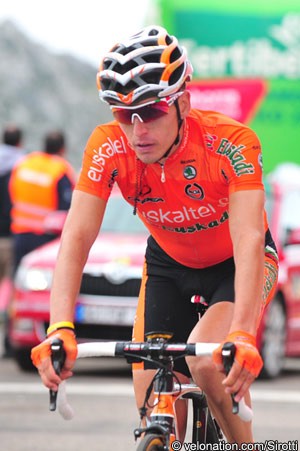Basque rider takes the first stage in his home region for 33 years after having to rethink his Vuelta
 The Vuelta a España’s return to the Basque Country for the first time in 33 years was greeted by a victory from local rider Igor Antón (Euskaltel-Euskadi). The 28-year-old from Galdakao, close to the base of final climb of the Alto El Vivero on the outskirts of Bilbao, won the stage after being a member of the long break of the day. Since an overall victory in the Vuelta was his primary objective of the season though, Antón had hoped to be arriving in the Basque capital under different circumstances.
The Vuelta a España’s return to the Basque Country for the first time in 33 years was greeted by a victory from local rider Igor Antón (Euskaltel-Euskadi). The 28-year-old from Galdakao, close to the base of final climb of the Alto El Vivero on the outskirts of Bilbao, won the stage after being a member of the long break of the day. Since an overall victory in the Vuelta was his primary objective of the season though, Antón had hoped to be arriving in the Basque capital under different circumstances.
“Because I was targeting the overall victory and I imagined that I’d enter Bilbao with the red jersey,” he admitted. “Unfortunately, the Vuelta didn’t go as I wanted, so I changed my goals and switched my focus onto this particular stage where I was at home, in front of my friends and family.”
Antón found himself struggling immediately the race hit the mountains on stage four. He surprisingly lost 1’27” to the other overall hopefuls on the climb to Sierra Nevada, then lost some more on the short climb to Valdepeñas de Jaén the next day. In recent stages his form has improved, but it was all too late for the overall classification.
“The uphill finishes at the Angliru and Peña Cabarga brought my morale back to the top and I got to believe that I could do well here, but I don’t know where I’ve found the strength to win,” he said. “Yeah, I understand that I owe it to the fantastic job of my team-mate Gorka Verdugo and the unbelievable support from the crowd. The climb of El Vivero is my daily bread at training.
“For the team, it’s historical!” he added. “For me as well, because it’s my first pro win from a breakaway group and it opens possibilities for my future. And now Euskaltel-Euskadi has won a stage in each Grand Tour this year.”
On the climb to El Vivero for the first time Antón appeared to exchange words with some of the hordes of Basque fans that lined the roads in a way reminiscent of the Pyrénéen climbs in the Tour de France.
“I didn’t speak to anybody but I enjoyed the way people supported me,” he explained. “It was crazy; I benefited from their encouragement all day long. This morning, I was stressed. I knew that I needed to get into the breakaway and I’m not experienced in this exercise. Fortunately, I found my best legs again and that allowed me to succeed another Basque rider, José-Enrique Cima, who was the last stage winner of the Vuelta in Bilbao 33 years ago.”
The Vuelta is Antón’s second Grand Tour of 2011, having ridden the Giro d’Italia back in May. Although he ignored the overall classification and merely fulfilled his mission of taking a stage victory, like many others who rode the race he has had problems reaching top form for another three-week race.
“It’s one of the factors,” he admitted. “After the Giro, I took a rest but I maybe resumed training before I’d recovered 100% of my capacities and I got food poisoning. It might have affected my training for the Vuelta. I reproduced the training plans that worked last year, but cycling isn’t an exact science.
“However, I’ve learned a lot from this Vuelta,” he added. “I haven’t had my best pedalling style but I’ve experienced how to suffer and come back to a successful level.”
Although much of the race has not gone to plan for Antón, he will still very likely return to the Vuelta next year, particularly following his emotional in his home town.
“I’ll have to look at the course first, but this is a race for me,” he declared. “Every year that ends with an even number, I normally do well: in 2006, I won stage 16 to Calar Alto; in 2008, I was on the edge of making the final podium when I crashed; in 2010, I won two stages before I crashed with the red jersey on my shoulders. This year, I’m having my apprenticeship for suffering and I hope to come back in 2012 on the right path and race for the overall win or the podium. I dream of it but this is only sport, after all.
“I prefer to think that I’ll never forget this special feeling of racing alone at the front in the streets of Bilbao closed to the traffic where I’ve been hundreds of times at training,” he explained. “I’ve seen and imagined everything: the monuments of the town, the Guggenheim museum…
“This day will remain in my memory for ever.”